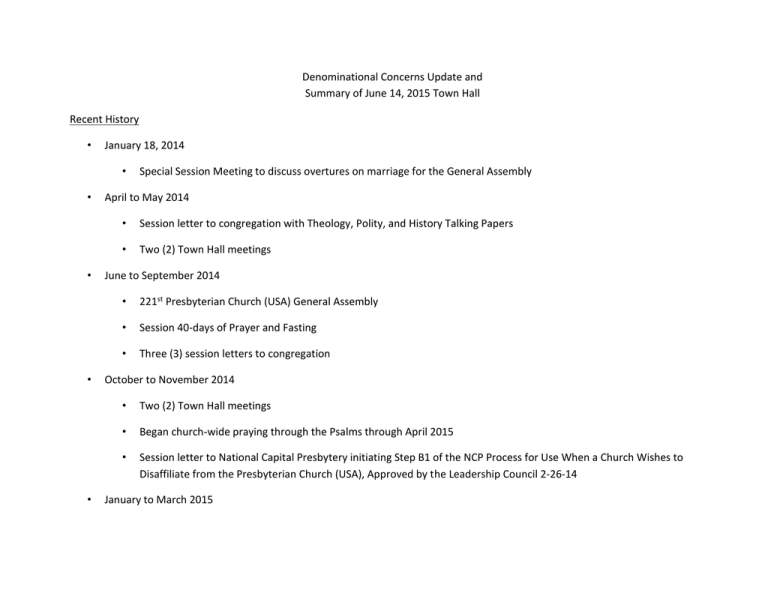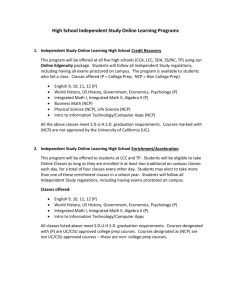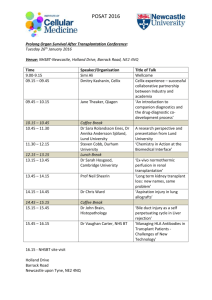Summary of 061415 town hall - Centreville Presbyterian Church
advertisement

Denominational Concerns Update and Summary of June 14, 2015 Town Hall Recent History • January 18, 2014 • • • • • Special Session Meeting to discuss overtures on marriage for the General Assembly April to May 2014 • Session letter to congregation with Theology, Polity, and History Talking Papers • Two (2) Town Hall meetings June to September 2014 • 221st Presbyterian Church (USA) General Assembly • Session 40-days of Prayer and Fasting • Three (3) session letters to congregation October to November 2014 • Two (2) Town Hall meetings • Began church-wide praying through the Psalms through April 2015 • Session letter to National Capital Presbytery initiating Step B1 of the NCP Process for Use When a Church Wishes to Disaffiliate from the Presbyterian Church (USA), Approved by the Leadership Council 2-26-14 January to March 2015 • Three (3) Elder Commissioners voted on GA decisions needing Presbytery approval at Presbytery Stated Meetings • Session met with National Capital Presbytery (NCP) Leadership Council representatives March 17, 2015 • Session letter to NCP initiating Step B2 Graphic showing steps / actions within the NCP Dismissal Process Step 1 - Session disagrees with decisions of the General Assembly Session sent letter to NCP November 2014 asking todisagreesSession and three (3) NCP Leadership Council Step 124, – When Session with GA Decision begin process representative met March 17, 2015 Step 2 – When there are conversations about leaving the denomination Session sent letter to NCP March 19, 2015 asking to move to Step 2 Leadership Council Delegation identified - met with Rev. Rob Bromhead and 2 elders - will meet with Session on June 16, 2015 Step 3 – Prior to any formal request regarding dismissal, the session will ask for an NCP Discernment Team to consult with the session and congregation Requires request by Session to move to Step 3 NCP Discernment Team will engage in a period of no less than 3 months of consultation, including at least six meetings with the session and the congregation Step 1: Session met with National Capital Presbytery (NCP) Leadership Council March 17 • • • • Session provided five (5) written questions to NCP in February (see below) Leadership Council Representatives responded to questions • Rudy Cohen (Moderator, NCP & 221st General Assembly Commissioner, Ruling Elder at Burke PC) • Quinn Fox (221st General Assembly Commissioner, Teaching Elder at National PC) • Wilson Gunn (General Presbyter, NCP) We do not want to speak for the Council, so please do not ask Session to attempt to summarize their answers. If we move to Step 3, you will have multiple opportunities to dialog with NCP representatives. Questions were: 1. Our Constitution in both the Book of Order and the Book of Confessions, affirms the authority of Scripture. However, past and recent General Assembly decisions seem to move further and further away from these affirmations. Please help us to reconcile these apparent departures from our Constitution. 2. The Holy Scriptures and our own Constitution clearly teach that our Resurrected Lord and Savior Jesus Christ is Divine and the only way of salvation. Yet, our observation is that there is an erosion of these truths amongst our denomination's teaching and ruling elders; an observation which deeply grieves us. Do you agree with this observation, and if so, what are the implications of this erosion on the future of our denomination's mission and vision? 3. Given the strong evangelical tradition in which CPC is firmly rooted and our observation that this stands in increasing contrast with the trajectory of the denomination; how can you guarantee that in the future CPC will be allowed to call, ordain, and install teaching and ruling elders consistent with our evangelical tradition without application of the Kenyon* precedent? 4. Jesus Christ gave the Church its mission in the Great Commission and our own Constitution teaches that the Church's mission is to make disciples of Jesus Christ. As you know, CPC is strongly committed to local and international missions. Can you please cite decisions and actions by the 221st General Assembly which will help us as a congregation within the PCUSA to more effectively create disciples of Jesus Christ locally and internationally? 5. For the life and ministry of CPC we have been a part of the “gracious inclusion” of the NCP and the PCUSA as we have oft been at odds with positions and decisions of the denomination. Even so, congregations with strong evangelical traditions such as CPC have become a diminishing minority in this denomination. As a result, many of our own members, and congregations and ministries with whom we previously partnered have reached a tipping point and chosen gracious separation. Given the increasingly polarized state between evangelical and progressive priorities, what are your specific plans to facilitate CPC’s evangelism, missions, and disciple-making so that it flourishes? Please provide specific examples. *In 1975, the Permanent Judicial Commission of the UPCUSA General Assembly overturned the Pittsburgh Presbytery's ordination of Wynn Kenyon. Kenyon had informed his Presbytery that he could not participate in services of ordination for women. Step 2: Reasons for the Session’s Continuing Distress 1. Doctrinal Differences and Theological Identity Denominations are formed around a shared understanding of truth that leads to a shared understanding of how we live out our faith. Sadly, there is less shared understanding of truth and practice between CPC and our denomination, the PC(USA), than ever before. The denomination is on a trajectory that will only widen the chasm between us and it is traveling that trajectory at an accelerated rate. Session is particularly distressed by the untenable diversity in a common understanding of the person and work of Jesus Christ, authority of the Bible, and historical Reformed theology. Once known for scholarly theology, biblical teaching, and adherence to core Christian orthodoxy and practice; the PC(USA) is adrift from its Biblical moorings and confused in its theological identity. Having largely abandoned the authority of Scripture, the PC(USA) has depended more on cultural arguments than biblical understanding for recent decisions. It has embarked on a decades-long search for a progressive identity by broadening its definition of orthodox belief and practice, while simultaneously refusing to define core tenants of Christian belief. The denomination has waffled on affirming faith in Jesus as the exclusive means of salvation and has given precedent to personal freedoms over the clear teaching of Scripture. Finally, the Presbytery and the denomination have been unable to address this growing divergence in a way which alleviates Session’s distress or facilitates CPC’s mission. 2. Mission and Witness CPC is passionate about sharing the good news of Jesus Christ to a lost and broken world. We believe in the transforming power of the Gospel to mold individuals into God’s image as revealed in Jesus. CPC’s mission to love Christ, love people, and serve the world is accomplished when together we are ignited by the Holy Spirit, active in ministry, and growing in discipleship. CPC desires to be in a connected relationship with a denomination that supports, nurtures, and resources the local congregation to this end as a shared mission. Yet, we find ourselves in a denomination where evangelism is not universally accepted as the central mission of the Church, is seldom the focus of efforts, and to some in leadership is even seen as coercive. Rather than multiplying the witness of our congregation, the denomination is often an impediment to our witness. More and more the denomination’s energies are shifting from evangelism and the Gospel’s transformative redemptive impact on individuals and communities to controversial political activism. Our own witness has been compromised as we have divided our limited energies between proclaiming the Gospel and differentiating ourselves from the denomination where we believe it has strayed from the Gospel. This divided focus has led to the loss of membership and the loss of opportunities for both CPC and the PC(USA). 3. Polity (church governance) and the Role of the Denomination The essential function of a denomination is to facilitate and magnify the Church’s mission through the unified witness of its congregations. It accomplishes this by an infrastructure (polity) that connects churches with shared theology, doctrine, and practice; combines resources; and provides nurture and accountability. However, as the PC(USA) has moved away from a shared understanding of doctrinal truth and its implication on how we live, its infrastructure has become a burden rather than a source of encouragement and empowerment. Over the years and in response to our denomination’s theological drift and its persistent inaction to make a course correction; we aligned ourselves with renewal movements like Presbyterian’s for Renewal, the Confessing Church, and the Fellowship of Presbyterians. These movements have shrunk and consolidated as more evangelical congregations leave the PC(USA). Locally, our leadership has sought fellowship, accountability, and encouragement through a smaller gathering of evangelical churches because we do not find these elements at Presbytery meetings where we seem to be more tolerated than embraced. The energy expended in this reverse role of protesting against the erosion of the Church’s witness to biblical truth, when it is the denomination that should be providing defense against false doctrine, is frankly exhausting and apparently fruitless. As witnessed by the most recent General Assembly’s failure to follow the church’s own polity, the infrastructure which used to be the means of accountability is no longer relevant. 4. Fellowship and Future The result of the PC(USA)’s confused identity and divided household is reflected in an ordained leadership where many pastors and elders deny the unique atoning death of Jesus Christ while others affirm it; where many leaders deny the doctrine of the Trinity and others believe it; where many see the Bible only as a guide while a shrinking group of other leaders seek to be obedient to the Bible’s authority as the uniquely inspired word of God. In this environment far fewer individuals called to ministry are choosing to be ordained in the PC(USA) and still fewer evangelical candidates are seeking ministries in the denomination. It is difficult to imagine a future within the PC(USA) where CPC will be able to readily identify, call, and retain evangelical pastors and staff. It is essential that we raise up future Reformed, thoughtful, evangelical leaders especially as society struggles with moral relativism. Yet, it is difficult to recommend the denomination to our own sons and daughters sensing God’s call to ministry when the denomination is not fulfilling its role in preserving truth or providing shelter from false doctrine. The Gospel must be proclaimed and we desire to help plant new churches, but it is difficult to enthusiastically support the planting of other PC(USA) churches. Next Steps: • Session is investigating other Reformed Denominations to which CPC may be dismissed if we request dismissal and is assessing their match with CPC’s theology and polity • Session met with Leadership Council delegation June 16, 2015 to: • • • Discuss the distress leading us to consider dismissal as outlined above and Ask questions about the NCP dismissal process Session voted to move to Step 3 on June 16. Steps and Actions within the NCP Dismissal Process Step 1 Triggering Event(s) Session disagrees with decisions of the General Assembly (GA) of the Presbyterian Church (USA) [PC(USA)] Actions November 24, 2014: Session sent letter to National Capital Presbytery (NCP), to request commencement of step 1 of NCP Dismissal Process March 17, 2015: Session met with three NCP Leadership Council representatives, to ask five clarification five questions about recent GA decisions and direction of the PC(USA) 2 3 Session is distressed with decisions of the GA March19, 2015: Session sent letter to NCP, to request commencement of step 2 of NCP Dismissal Process Session or Congregation has discussions about leaving the PC(USA) June 4, 2015: Rev. J. Robin Bromhead and two other members of Session met with NCP Leadership Council Delegation, to discuss the distress that Rev. Bromhead has with decisions of the GA Session is still distressed with decisions of the GA, believes that it is time to request dismissal from the PC(USA) 4 NCP DT, in consultation with Session, determines that Congregation wishes to request dismissal from the PC(USA) 5 Information-gathering meeting satisfies quorum of at least 60% of active members, and at least 80% of those present vote in favor of seeking dismissal from the PC(USA) June 16, 2015: Session will meet with NCP Leadership Council Delegation, to discuss the distress that the Session has with decisions of the GA Session sends letter to NCP, to request commencement of step 3 of NCP Dismissal Process NCP Discernment Team (NCP DT) will meet with the Session and Congregation at least six times over a period of no less than three months, to effect reconciliation between CPC and PC(USA) If sufficient division exists in the Congregation between those who wish to be dismissed from the PC(USA) and those who wish to remain in the PC(USA), NCP DT schedules additional meetings with Session and Congregation to spell out implications of such a division; otherwise, NCP DT recommends that NCP call an information-gathering meeting of the Congregation, where an advisory vote will be taken on whether or not the Congregation wishes to seek dismissal from the PC(USA). Said meeting will require a quorum of at least 60% of active members, be conducted by secret written ballot, and require a vote of at least 80% of those present to be in favor of seeking dismissal from the PC(USA). Session appoints team to work with NCP DT to develop recommendation regarding allocation of assets and property; if said allocation is successfully negotiated between the two teams, then NCP will vote on whether or not to grant the Congregation’s request to be dismissed from the PC(USA), and Rev.Bromhead and the Clerk of Session will assist NCP in contacting any members of the Congregation who wish to remain in the PC(USA)

